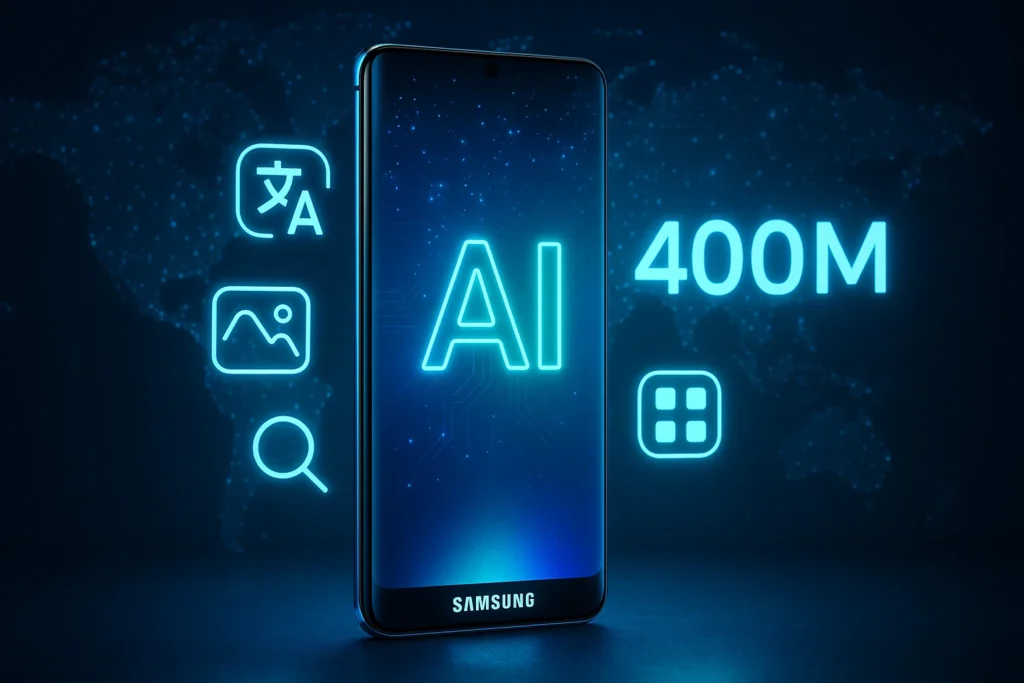Samsung Galaxy AI will soon power 400 million devices, transforming how you work, connect, and live. Discover what’s changing in your phone experience.
Samsung Galaxy AI to Hit 400 Million Devices: How Your Phone Will Change
Introduction: A Turning Point for Smartphones
Artificial Intelligence is no longer confined to futuristic labs or high-end workstations—it’s in your pocket. With Samsung Galaxy AI projected to reach 400 million devices worldwide, the way we use our smartphones is about to transform dramatically. From smarter communication tools to advanced image editing and real-time translations, Samsung is bringing AI features to millions of people at scale.
But what does this massive rollout mean for everyday users in the USA, enterprises, policymakers, and investors? To answer this, let’s dive into Samsung’s Galaxy AI ecosystem, its real-world impact, and the ripple effects across industries.
What Is Samsung Galaxy AI?
Samsung Galaxy AI isn’t just one feature—it’s an ecosystem of artificial intelligence-powered tools embedded directly into Galaxy devices. Built on-device and in the cloud, Galaxy AI is designed to enhance everyday smartphone experiences.
Key Capabilities:
- Live Translate: Real-time voice and text translation during phone calls.
- Interpreter: Split-screen translation for in-person conversations.
- Circle to Search (powered by Google AI): Instantly identify or search objects by circling them on screen.
- Generative Photo Editing: AI tools for resizing, repositioning, or filling in parts of an image.
- Summarization & Note Assist: Automatic meeting notes, summaries, and formatting.
- Chat Assist: AI-powered tone adjustments for messages and emails.
In short, Galaxy AI blends practicality with futuristic capability—turning the smartphone into an intelligent personal assistant.
Scaling to 400 Million Devices: Why It Matters
When a company like Samsung scales AI to 400 million active devices, it’s not just an update—it’s a shift in how billions of people interact with technology.
For Consumers in the USA
- Communication without barriers: Language divides shrink with real-time translation.
- Everyday convenience: Shopping, learning, and navigation become frictionless with Circle to Search.
- Privacy edge: Many AI functions run on-device, reducing reliance on cloud servers.
For Enterprises
- Productivity boost: AI tools for note-taking and summaries make workflows more efficient.
- Global collaboration: Live Translate and Interpreter redefine international teamwork.
- Security: Samsung emphasizes Knox-level AI protection, crucial for enterprise data.
For Investors
- Market differentiation: AI features may help Samsung secure a stronger foothold in the competitive smartphone market.
- Upsell opportunities: Premium features tied to Galaxy Ultra models could boost margins.
- Ecosystem stickiness: Once users get used to AI tools, switching to non-AI competitors feels like a downgrade.
For Policymakers
- Digital inclusion: AI-powered accessibility tools can bridge gaps for people with disabilities.
- Data governance: On-device AI reduces international data transfer issues, but regulatory oversight will be crucial.
Galaxy AI in Action: Everyday Scenarios
1. Travel Without Language Barriers
Imagine landing in Tokyo with no knowledge of Japanese. With Galaxy AI’s Live Translate, you can call your hotel, ask directions, or even order food—all in real time, with natural translation on both ends.
2. Smarter Shopping with Circle to Search
See a bag you like on the subway? Circle it on your phone screen, and Galaxy AI instantly finds similar products online, compares prices, and suggests stores nearby.
3. Productivity Reimagined
Remote workers in the USA can join meetings across time zones. Galaxy AI summarizes discussions, captures key points, and even drafts follow-up emails. What used to take hours is done in minutes.
4. Photography Redefined
Accidentally cut someone out of your vacation shot? Galaxy AI’s Generative Photo Editing can reconstruct the missing background and make the picture look flawless—no Photoshop skills required.
The Competitive Landscape: Samsung vs. Apple, Google, and Others
Samsung isn’t alone in the AI race.
- Apple is expected to roll out “Apple Intelligence” with iOS 18, but availability is limited to newer models.
- Google Pixel devices already offer AI-driven editing tools and Assistant features.
- Chinese smartphone makers like Xiaomi and Oppo are also building generative AI into devices.
Samsung’s Advantage
The scale of Galaxy AI’s rollout—400 million devices—is unmatched. Unlike Apple’s limited adoption strategy, Samsung is democratizing AI by making it available across mid-range and premium models.
Hardware Meets AI: Why Your Phone Is Ready
AI at this scale requires powerful chips and optimized software. Samsung’s latest Galaxy devices are powered by Qualcomm Snapdragon 8 Gen 3 for Galaxy and Exynos equivalents, specifically designed for AI workloads.
- On-Device AI: Faster, private, works offline.
- Cloud-Based AI: Handles heavier generative tasks.
- Hybrid Approach: Ensures balance between speed, power efficiency, and accuracy.
The Economic Impact of Samsung’s AI Expansion
Rolling out Galaxy AI to 400 million devices has wider implications.
- Consumer spending: More demand for premium Galaxy models.
- App ecosystem: Developers can create apps optimized for Galaxy AI.
- Telecom boost: AI-driven usage means more data consumption, benefiting carriers.
For the USA specifically, this could drive competition in 5G plans, app innovation, and AI-ready business solutions.
Risks & Concerns: What You Should Know
While exciting, Samsung’s Galaxy AI rollout isn’t without challenges.
- Privacy: Even with on-device AI, users may worry about how personal data is processed.
- Energy use: Running AI features may drain battery faster.
- Cost of devices: AI could become a justification for higher smartphone prices.
- AI bias: Translation and generative tools may still struggle with accuracy in certain contexts.
Samsung will need to address these concerns through transparency, software updates, and user education.
Future Outlook: Where Samsung Galaxy AI Is Heading
Samsung has already hinted that Galaxy AI will expand beyond smartphones into:
- Tablets & Laptops: Galaxy Book AI integration.
- Wearables: AI-driven health insights from Galaxy Watches.
- Smart Home: AI-powered SmartThings ecosystem.
- Automotive Partnerships: In-car AI features for navigation and safety.
The vision is clear: a fully connected Galaxy ecosystem where AI is the glue.
Conclusion: The AI Revolution in Your Pocket
The fact that Samsung Galaxy AI is scaling to 400 million devices marks a historic shift in the smartphone era. This isn’t just about flashy features—it’s about breaking down communication barriers, empowering businesses, and reshaping how we live daily life.
For American users, this means more freedom, productivity, and creativity—all in the palm of your hand. Whether you’re an investor eyeing the smartphone market, a researcher exploring AI ethics, or simply someone who wants better tools for everyday life, Samsung Galaxy AI represents the future of mobile technology.
The smartphone is no longer just smart—it’s becoming intelligent. And with 400 million devices joining the AI revolution, the future is already here.

